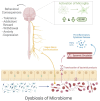Gut-Microbiome Implications in Opioid Use Disorder and Related Behaviors
- PMID: 38390617
- PMCID: PMC10880781
- DOI: 10.3389/adar.2022.10311
Gut-Microbiome Implications in Opioid Use Disorder and Related Behaviors
Abstract
Substance use disorder (SUD) is a prevalent disease that has caused hundreds of thousands of deaths and affected the lives of even more. Despite its global impact, there is still no known cure for SUD, or the psychological symptoms associated with drug use. Many of the behavioral consequences of drug use prevent people from breaking the cycle of addiction or cause them to relapse back into the cycle due to the physical and psychological consequences of withdrawal. Current research is aimed at understanding the cause of these drug related behaviors and therapeutically targeting them as a mechanism to break the addiction cycle. Research on opioids suggests that the changes in the microbiome during drug use modulated drug related behaviors and preventing these microbial changes could attenuate behavioral symptoms. This review aims to highlight the relationship between the changes in the microbiome and behavior during opioid treatment, as well as highlight the additional research needed to understand the mechanism in which the microbiome modulates behavior to determine the best therapeutic course of action.
Keywords: behavior; gut-brain; microbiome; opioid use disorder; substance use disorder; withdrawal.
Copyright © 2022 Herlihy and Roy.
Conflict of interest statement
The authors declare that the research was conducted in the absence of any commercial or financial relationships that could be construed as a potential conflict of interest.
Figures

Similar articles
-
Linking the gut microbiome to microglial activation in opioid use disorder.Front Neurosci. 2022 Dec 16;16:1050661. doi: 10.3389/fnins.2022.1050661. eCollection 2022. Front Neurosci. 2022. PMID: 36590299 Free PMC article. Review.
-
The role of the gut microbiome in opioid use.Behav Pharmacol. 2020 Apr;31(2&3):113-121. doi: 10.1097/FBP.0000000000000538. Behav Pharmacol. 2020. PMID: 31895059 Free PMC article. Review.
-
The Gut-Brain Axis in Opioid Use Disorder: Exploring the Bidirectional Influence of Opioids and the Gut Microbiome-A Comprehensive Review.Life (Basel). 2024 Sep 25;14(10):1227. doi: 10.3390/life14101227. Life (Basel). 2024. PMID: 39459527 Free PMC article. Review.
-
The bidirectional relationship between opioids and the gut microbiome: Implications for opioid tolerance and clinical interventions.Int Immunopharmacol. 2023 Dec;125(Pt A):111142. doi: 10.1016/j.intimp.2023.111142. Epub 2023 Oct 31. Int Immunopharmacol. 2023. PMID: 37918085 Review.
-
Dietary Supplementation with Omega-3 Polyunsaturated Fatty Acids Reduces Opioid-Seeking Behaviors and Alters the Gut Microbiome.Nutrients. 2019 Aug 14;11(8):1900. doi: 10.3390/nu11081900. Nutrients. 2019. PMID: 31416242 Free PMC article.
Cited by
-
Anxiety-like behavior during protracted morphine withdrawal is driven by gut microbial dysbiosis and attenuated with probiotic treatment.Gut Microbes. 2025 Dec;17(1):2517838. doi: 10.1080/19490976.2025.2517838. Epub 2025 Jun 15. Gut Microbes. 2025. PMID: 40518557 Free PMC article.
-
Beyond the Syndemic of Opioid Use Disorders and HIV: The Impact of Opioids on Viral Reservoirs.Viruses. 2023 Aug 9;15(8):1712. doi: 10.3390/v15081712. Viruses. 2023. PMID: 37632053 Free PMC article. Review.
-
Pharmacogenomic and Pharmacomicrobiomic Aspects of Drugs of Abuse.Genes (Basel). 2025 Mar 30;16(4):403. doi: 10.3390/genes16040403. Genes (Basel). 2025. PMID: 40282363 Free PMC article. Review.
-
The Bidirectional Interplay Between Substances of Abuse and Gut Microbiome Homeostasis.Life (Basel). 2025 May 22;15(6):834. doi: 10.3390/life15060834. Life (Basel). 2025. PMID: 40566488 Free PMC article. Review.
-
Alterations of gut microbiome following gastrointestinal surgical procedures and their potential complications.Front Cell Infect Microbiol. 2023 Jun 2;13:1191126. doi: 10.3389/fcimb.2023.1191126. eCollection 2023. Front Cell Infect Microbiol. 2023. PMID: 37333847 Free PMC article. Review.
References
Publication types
LinkOut - more resources
Full Text Sources

